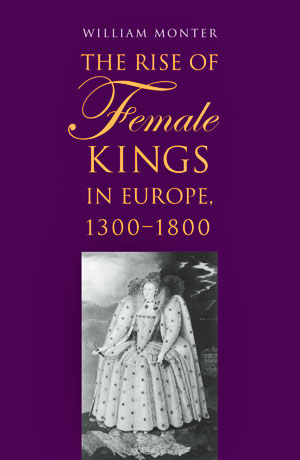
This is the first modern history of officially-acknowledged female rulers in major states.
It focuses on Europe between 1328 and 1796 because that is the only time and place with a sizable number of them. Women were never candidates in Europe’s major elective polities like the Holy Roman Empire or the Papal states. But in most European kingdoms—France became the outstanding exception—women could inherit thrones after 1300 in the absence of suitable males.
In order to identify these female rulers, I use numismatics, a discipline ignored by “mainstream” political history. Ever since Cleopatra VII, bona fide women rulers almost everywhere were literally “on the money,” and their coins survive. This criterion locates thirty women sovereigns in fourteen widely-separated European states, including the “westernizing” eighteenth-century Russian empire (the book includes a map on pages xiv-xv).
My 458-year sample seems long enough to sketch meaningful changes in the conditions under which women exercised supreme political authority, but also small enough to permit at least a brief sketch of every one. Their failures are as instructive as their successes.
The thread that gives the book its conceptual unity is how these female sovereigns handled the problem of matrimony. Like conventional queens, they were expected to produce legitimate heirs. Unsurprisingly, ninety percent of them married at some point; Elizabeth I of England became the first of three exceptions.
But should women invested with sovereign authority be expected to show conventional subordination and deference to husbands? The answers varied with individuals, but evolved over time towards greater wifely autonomy. The anomalous situation in which women became “kings” (and were frequently crowned as such) created enormous problems in defining the role of their husbands. Five of them succeeded their wives on the throne, in 1395, 1399, 1401, 1441, and 1694. But three were murdered (in 1345, 1567, and 1762), while another fled to a French monastery in 1421 and yet another died insane in a foreign prison in 1586.
I have tried to make this investigation extremely wide. The rarity of documented female rulers in large, well-organized states makes it necessary to find them wherever one can, and as far back as reliable evidence permits. Consequently, I have had to extend my usual area of professional competence—sixteenth- and seventeenth-century western Europe—both backwards into antiquity and forwards as far as Europe’s first democratically-elected head of government in 1979. I have also learned to deploy two auxiliary disciplines, both completely new to me. The first is numismatics. The other is film studies—cinema provides our most vivid images of these dead white women.
A comprehensive approach enables us not only to compare the position of female rulers in old Europe with that elsewhere in the world, but also to see that women vanished from positions of political leadership throughout Western civilization during most of the last two centuries. In the first instance, after 1300 (although not until then), women had an easier time ruling major states in Europe than they did anywhere else in the world. In the second instance, women have had a much harder time acquiring political leadership in modern states than they did in “antiquated” kingdoms. A Frenchman already noticed this in 1801, and recent studies suggest that women still do better politically in monarchies than in republics.
A long and winding professional path led me to this book, which is quite unlike any of my previous nine. Soon after introducing a survey course in women’s history in 1972, I spotted the paradox of occasional supreme female authority amidst otherwise unrelieved subordination. But I saw no way to understand it. Only many years after ceasing to teach women’s history did I find an opportunity to investigate this problem afresh, using the hypothesis that rule by autonomous women gradually became better accepted over time, until modern secular liberal democracy dominated Western politics.
My favorite passage comes at the end of the first chapter (pages 23-25), comparing and contrasting the forms of doppelgänger used by three women, many centuries and thousands of miles apart, in order to explain and justify their unusual authority. The most difficult was required for a Chinese woman of notoriously humble ancestry. Her successful formula combined an obscure Buddhist sutra, describing a bodhisattva incarnated in an “instrumental” (but not real) female body, with a Confucian aphorism about the Mandate of Heaven falling on a “saint [who comes] from grass.” The resulting doctrine was preached by acolytes in special temples throughout her empire; two of their master texts have been preserved.
Anohter favorite section (pages 36-40) describes the major unwritten rules governing female inheritance in European monarchies. Because formal political theory evaded the problem, these rules must be induced from surviving evidence. They were not obvious. Even Catherine the Great, attempting to draft rules of succession for the Russian Empire, could not find a formula that would justify her own rule. The most fundamental criterion, although almost never discussed specifically, turned out to be legitimate birth. In 1460, the last illegitimate male to acquire a European kingdom by overthrowing a younger but legitimate female sibling did so only with assistance from an Egyptian jihad.
I’d also be happy if casual readers opened to the illustrations grouped after page 121. Originally I requested forty, but ended up with only seventeen. However, all of these carry politically-charged messages about how women rulers have been presented in ways emphasizing their authority across the 3500 years separating Hatshepsut and Margaret Thatcher.
One of the most satisfying aspects of this book is that it has been possible to complete it at a time when one can combine old-fashioned historical research with the multiple resources available through the internet. I still explore a few dusty archives, read rare books in major western European languages, and inspect places in various countries that remain closely associated with long-ago women rulers. But I could never have sifted so much diverse written and pictorial information so efficiently without the internet.
It has also proved extremely helpful that during my professional lifetime, English has become the standard or default language for scholars throughout Europe as well as in other parts of the world.
In combination, these advantages offer optimum possibilities for deepening our comprehension of what these thirty women sovereigns could and could not do about commanding all-male political elites.
Although Europe’s female monarchs were much likelier than their male counterparts to abandon their grip on sovereignty, this work interprets Europe’s overall experience of female rule as a glass that is half-full rather than half-empty, I expect it to spark controversy; the Republic of Letters usually requires dialectical processes in order to produce incremental improvements.
I further realize that a 75-year-old man inevitably perceives many things differently from the mostly younger women who will probably comprise a majority of my readers. Nevertheless, I think being male helps me understand one vital problem about “female kings”: why were their orders routinely obeyed by entirely male political elites who had been conditioned to regard women as inherently inferior? My epiphany occurred on a transatlantic flight when a woman’s voice announced on the intercom, “This is your Captain speaking.” Captain is also a military rank, and every man on board knew that he should follow orders from someone with unquestionable credentials to call herself Captain Renée.


William Monter is Professor Emeritus of History at Northwestern University, where he specialized in early modern Europe from 1963-2002. His previous books include studies of Calvin’s Geneva, witchcraft trials in France and Switzerland, the Spanish Inquisition, heresy prosecutions in Renaissance France, and the Duchy of Lorraine. His first work about women’s history, which he also taught from 1972-1990, was prepared with help from a Mellon Emeritus Fellowship in 2008-2009.